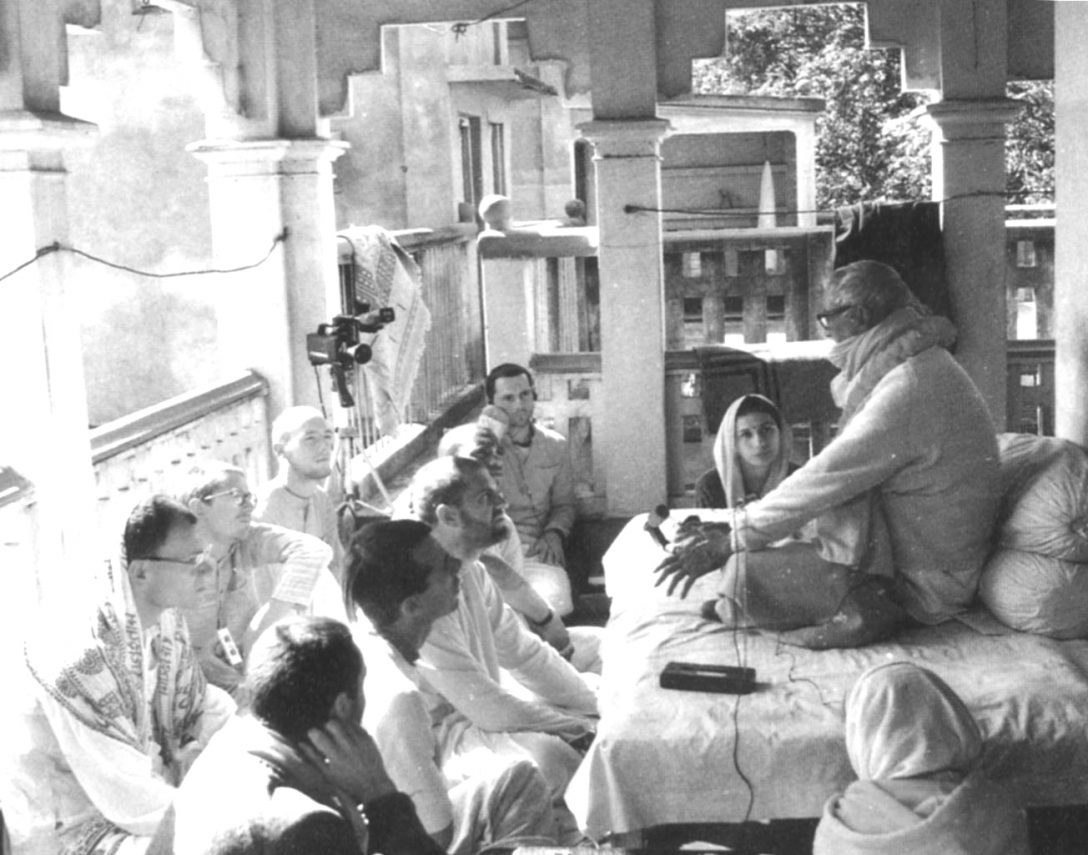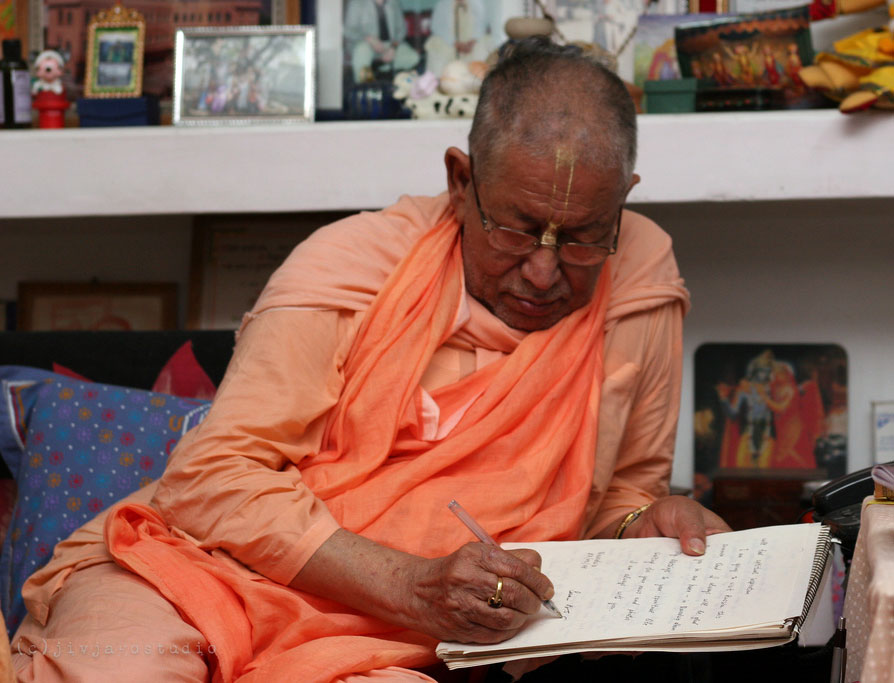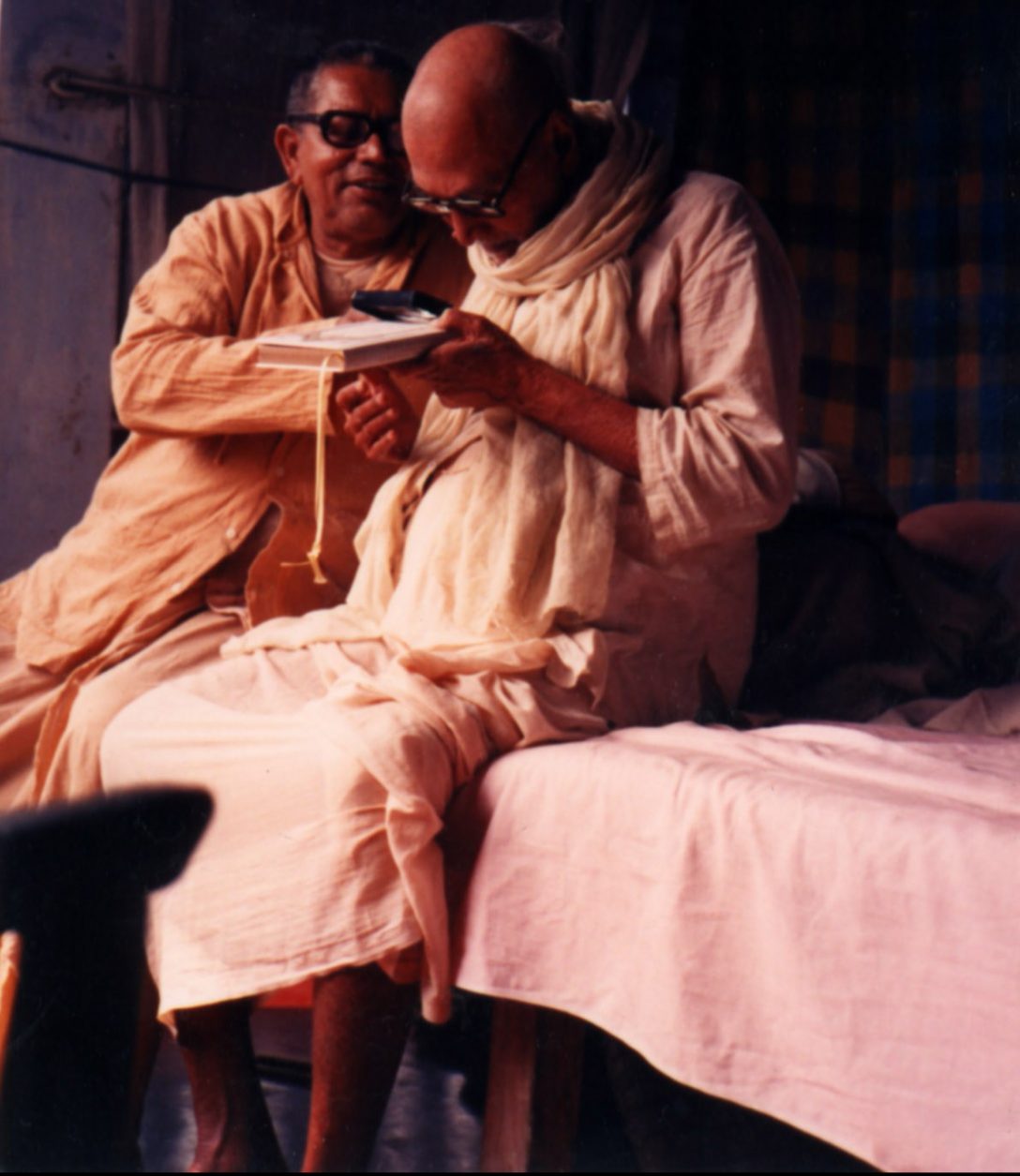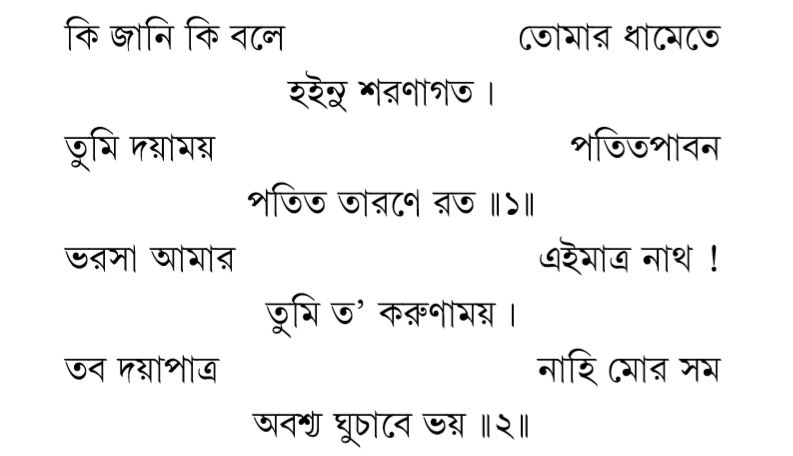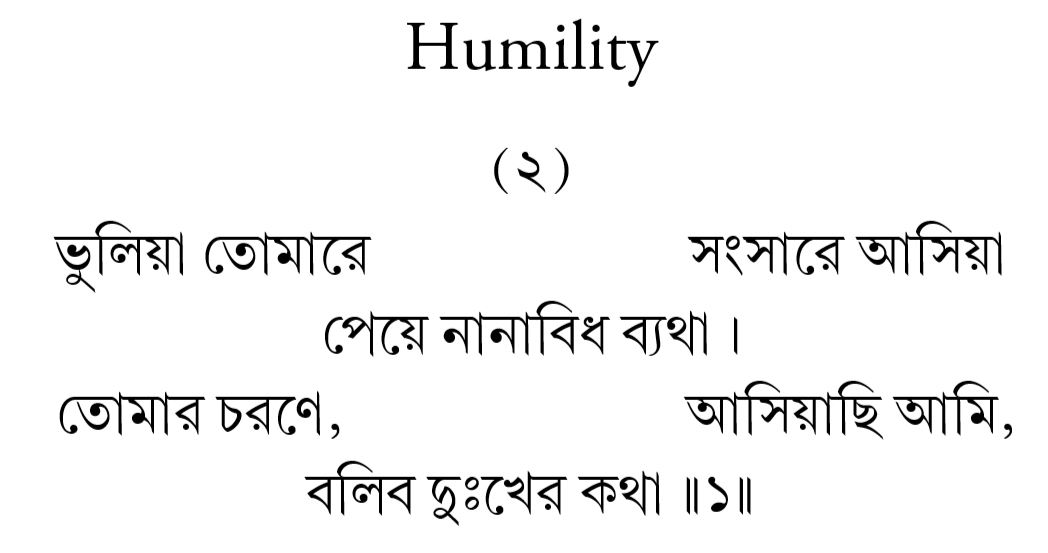What are the waves of the infinite, what sort of wave will come to touch you from the infinite, the centre of infinite, of love, beauty? Wait and see. Be clear, open, unbiased.
For the satisfaction of Srila Gurudev and the Vaisnavas, we are happy to inaugurate this new series of excerpts from the talks of the Guardian of Devotion, our beloved grand-guru, His Divine Grace Sri Srila Bhakti Raksak Sridhar Deva-Goswami.
Download mp3 audio.
mayā tatam idaṁ sarvaṁ jagad avyakta-mūrtinā
mat-sthāni sarva-bhūtāni na chāhaṁ teṣv avasthitaḥ
na cha mat-sthāni bhūtāni paśya me yogam aiśvaram
(Srimad Bhagavad-gita 9.4–5)
“I am everywhere, everything is in Me; I am nowhere, nothing is in Me. I am not a madman. Try to have an estimation of Myself, Arjuna, what am I.” Has such a bold statement ever come in the world of philosophy? (Chuckling) “I am everywhere, I am nowhere, everything in Me, nothing in Me. Try to ascertain, what am I. This sort of straight, simple, and most perplexing, and impossible possible together. I am there.”
So,
jñāne prayāsam udapāsya namanta eva
jīvanti san-mukharitāṁ bhavadīya-vārtām
Give up your attempt of measuring Him, but through faith try to approach. You are finite, so how much faith may you have about infinite? Very little. So don’t think that you will be deceived, that your faith will deceive you. You are a teeny person; what is the length and breadth of your faith? In the infinite anything is possible. So don’t be afraid of your blind faith when you come in the search of Krishna, infinite. Only faith can take you there, and no knowledge. It is clearly stated in Bhagavatam. Never approach with the instrument of knowledge. That will deceive you. But through faith Adhoksaja can come down. And if you doubt He may not care to come down to you.
Open, spread wide your heart to receive Him, and prepare yourself for what sort of wonderful lila He may come to show you. Be so much broad. And wait. What are the waves of the infinite, what sort of wave will come to touch you from the infinite, the centre of infinite, of love, beauty? Wait and see. Be clear, open, unbiased. Don’t go to measure with your teeny examples from this finite world of nasty nature.
tatra laulyam api mūlyam ekalam
Only your hankering can help you to have a touch of that magnanimous divine thing. If you go to challenge He will not care to come. What is the loss to Him? You are deceived. Go forward with your heart within.
jñāne prayāsam udapāsya namanta eva
jīvanti san-mukharitāṁ bhavadīya-vārtām
sthāne sthitāḥ śruti-gatāṁ
Brahma says “jānanta eva jānantu, those that say they know something, let them enjoy self-deception thereby, but manaso vapuṣo vācho vaibhavaṁ tava go-charaḥ, I could not enter into the very negligent slight point of your acquaintance. This is my finding.” Brahma says like that. “Those puffed up fools, they may talk about anything, they can know this, they can know that, everything can be known, let those fools dance with their foolish tendency. But I am sure that no instrument can have any slight touch of Him.” He is always new, always new, of new characteristic. He is infinite. Finite and infinite are of opposite character.
When we went to preach in Karachi the Arya Samaj thought, “We have got a prey, Vaisnavas are idolaters.” The president came to attack, and he told me, “If the finite can know the infinite then He is not infinite.” It came to my mind immediately, “If infinite cannot make Himself known to finite then He is not infinite.” Just opposite. He made a handshake, “Namaste.”
That is only our solace, that the infinite can make Himself known to the finite. And finite cannot know infinite. So we always foster that characteristic of the infinite, His grace. That should be our fare, our attitude. We have come not to deal with a limited thing. My aspiration is not so base, and mean. I have come in the relativity of the infinite so my behaviour must be according to that.
tṛṇād api su-nīchena
taror api sahiṣṇunā
amāninā māna-dena
The negative tendency should be increased to attract the positive. “I can’t stay without Your least connection.” With that we have to invite him. “I am din and poor and mean, I am so and so, the meanest fellow, there is no one meaner than myself.” That is the way.
Our Prabhupad used to give an example: in a fair it is seen that a bamboo post is there and it is smeared with oil and ripe plaintain fruit, so it is very slippery; and there is a man on the side who says that if one can climb up he will be given such a reward. And everyone, wherever he catches the pole, he comes down. He cannot go up. The aroha pantha [ascending path] is like that. We cannot go up. It is slippery. We can come down, but we cannot go up.
So we are brave enough to deal with such a thing, we have such audacity. But still the position is there, that it is possible by His grace, the line of His grace; He wants to distribute Himself in a particular line: srauta pantha, guru paramparya. Our necessity is exclusively there with the srauta paramparya, guru paramparya. The knowledge, and the bhajan, everything comes down from infinite to finite and never aroha pantha, from finite to infinite. That should always be the backbone of our movement. So whatever we shall go to do we shall look up to Gurudev, “If you do, it may be done. I have nothing, I am nowhere Sir, I am nowhere.”
Once I found in the history of Ramanuja that he had a sitting with a mayavadi pandit for fourteen days and could not defeat him; he came frustrated to Varadaraja [Deity of Lord Vishnu worshipped in South India], “What am I, I can’t defeat in discussion. For so many days I am trying to argue, but I am nothing, nowhere. I should not go on with my head erect as an acharya of the sampradaya.” He prayed at Varadaraja’s temple. And the next day, no sooner had he begun a slight talk, than that gentleman expressed his defeat. He clearly showed, “Yes, I have understood what you have said. I am wrong, and what you say is right.” Easily that man was defeated.
So, devotees are always expectant upward, “By Guru’s will: I have got nothing. Nothing. He may do through me. If I go to assert myself I shall not only be defeated, but I shall also be lost. But when I shall go to show even a proud attitude in the name of my Guru, and sincerely, then it will be bhajan. It will help me and others also.” The tendency will be to take power from above; the attempt of the acharyas will always be to bring things from above, from their guru. “By your grace.” Always dependent. He can never say, “I am in possession of the potency, power.” No.
jagāi mādhāi haite muñi se pāpiṣṭha
purīṣera kīṭa haite muñi se laghiṣṭha
[“I am more sinful than Jagāi and Mādhāi and even lower than the worms in the stool.”]
mora nāma śune yei tāra puṇya kṣaya
mora nāma laya yei tāra pāpa haya
(Sri Chaitanya-charitamrta: 1.5.205-6)
[“Anyone who hears my name loses the results of his pious activities. Anyone who utters my name becomes sinful.”]
The conception of the ego of the negativity is so intense. “I am such. But Nityananda Prabhu is great, He is patita-pavan, and so I have got.”
ye yathā patita haya tava dayā tathodaya
tathā āmi supātra dayā
“I can claim because I am the most fallen. I think I realise that I am the most fallen. I have got the greatest claim for your grace, mercy.” That should be the attitude of a real devotee. As mean as one conceives, has a conception of himself, so great he is in the eye of the devotees. Dainya. Hankering, laulyam, hankering, arti, that is their wealth, the wealth of the devotees, it is there. “I am proud of the power of my Gurudev and never of myself.” That should be the attitude of the devotee.
Spoken by Srila Param Guru Maharaj, 28 February 1981, Sri Nabadwip Dham.

